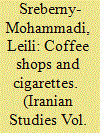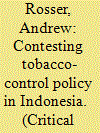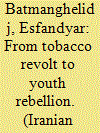| Srl | Item |
| 1 |
ID:
118794


|
|
|
|
|
| Publication |
2013.
|
| Summary/Abstract |
This essay explores the experiences of a young community of diasporic Iranians living and working in Tehran during the years 2007-2009 when the author lived there. Through analysis of the lived experiences of this group, the article highlights a unique experience that is often absent from current discussions of "diaspora." In the preliminary research, a redeployment of often taken-for-granted concepts such as "home" and "abroad" are proposed and a conceptualization of migration and diaspora that problematizes stasis and movement is reconsidered.
|
|
|
|
|
|
|
|
|
|
|
|
|
|
|
|
| 2 |
ID:
139444


|
|
|
|
|
| Summary/Abstract |
Over the past decade and a half, the Indonesian government has progressed fitfully and inconsistently toward a stricter tobacco-control policy regime, albeit without much impact on the country's worsening tobacco epidemic. This article explains this pattern of reform in terms of the unequal but changing relationship of power between tobacco companies and tobacco farmers, on the one hand, and tobacco-control advocates based in NGOs, health professional organizations, universities, and international organizations, on the other. The first of these coalitions has had greater structural leverage, better political connections, stronger organizational capacity, greater ability to mobilize popular forces, and more capacity to cultivate a positive public image. But the second coalition has been able to exercise some influence over policy because of changes wrought by democratization. In this analysis, the author engages with the literatures on (1) Indonesia's political economy in the post–New Order period and (2) the politics of tobacco control in developing countries. With regard to the former, the author argues that we need to give greater attention to the role of actors previously excluded from the policy-making process than is currently the case. With regard to the latter, the author contends that more focus is needed on domestic actors and political institutions in shaping tobacco-control policy. Looking to the future, the author suggests that further progress in Indonesia's tobacco-control policies will be contingent upon an ongoing process of struggle; however, there are signs that the tide is turning in favor of the second coalition.
|
|
|
|
|
|
|
|
|
|
|
|
|
|
|
|
| 3 |
ID:
143587


|
|
|
|
|
| Summary/Abstract |
Focusing on the cultural influence of the cigarette, this paper synthesizes a wide range of evidence to argue that the cigarette was a fundamental primer for Iran's encounter with modernity, especially as understood in the context of western influence. Applying the dramaturgical theories of sociologist Erving Goffman, it is argued that the cigarette is an instantiation of the “sign-equipment” of modernization used to refashion the identity and subjectivity of Iranian men and women. This refashioning has occurred in three distinct periods. In the first period (1860–1930), cigarette smoking was a habit adopted by the Persian elite in an attempt to mediate the encounter with European colonial figures. In the second period (1930–70), cigarettes were leveraged by Iranians who wished to be seen as upwardly mobile. In the final and contemporary period (1970–present), cigarettes have become ubiquitous among the adult population, but smoking itself has become the act of youth rebellion as experimentation occurs at increasingly young ages.
|
|
|
|
|
|
|
|
|
|
|
|
|
|
|
|